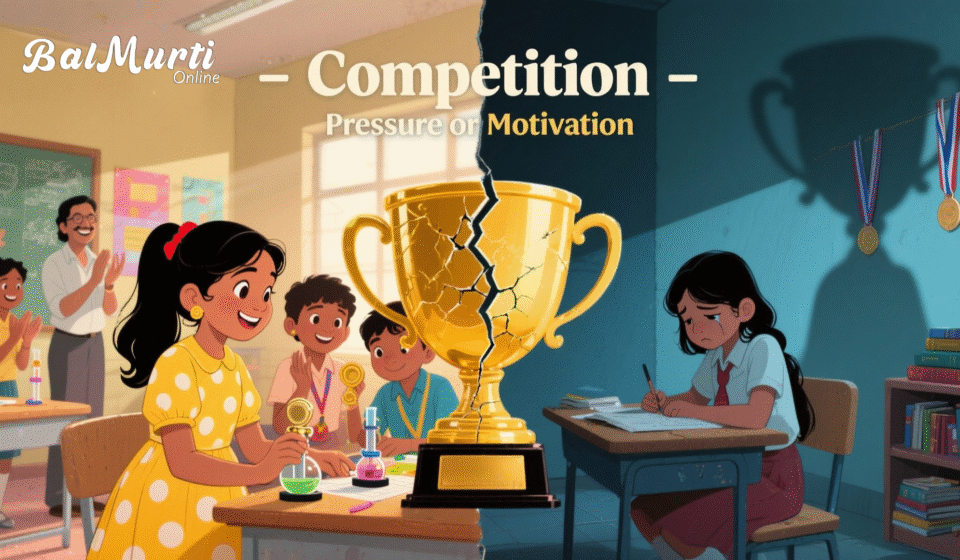
Competition for Children: Pressure or Motivation?

Children need to be taught that competition isn’t just about winning. What matters is what we learn through the competition, and how we can bring happiness to others’ lives.
Table Of Content
Successful parents shouldn’t pressure their children, but instead, make them part of a unique competition; one filled with encouragement, inspiration, and joy.
Today’s world is called a competitive era. And so, we push children into this race too. Whether it’s academics or sports, parents want their child to always come first. As a result, the joy slowly evaporates from the child’s life.
What should successful parents do? They should motivate their children towards a special kind of competition.
And what kind of competition is that? Let me share a story…
A Unique Competition
In a certain city, a unique competition was organized for children; to distribute toys. Each participating child was given a brand-new toy. But the rule was, they couldn’t keep the toy for themselves. They had to find a poor or needy child and happily gift the toy to them. The child who shared their toy with the most happiness and contentment would be declared the winner.

A nine-year-old girl named Rivu also participated. She was given a beautiful, shiny, red doll. For a moment, Rivu thought, “I wish this doll was mine.” But then, she remembered the rule of the competition.
Carrying the doll, Rivu went to a poor neighborhood. There, she saw a little girl playing in the dust. Her clothes were torn, and she had no toys.

Rivu approached the girl and held out the new red doll towards her. “Here… this is for you,” said Rivu. The poor girl’s eyes sparkled. Her small hands trembled as she accepted the doll. She looked at it, then at Rivu, and gave a big, innocent smile. That smile was so pure, so beautiful… Rivu’s heart filled with joy. She felt as if she had done something truly great.
When Rivu returned to the competition venue, her face carried a unique peace and satisfaction. Many children shared their stories with the organizers. When Rivu’s turn came, she simply said: “I gave a doll to a little girl. The happiness I saw on her face… was the greatest gift of my life. I think… that’s the real competition.”
Everyone present; organizers and audience alike; were deeply moved by Rivu’s words.
That day, Rivu didn’t receive any trophy or medal. But the satisfaction and happiness she earned were far bigger than any prize.
When Does Competition Become Pressure?

Every parent needs to understand; when does competition become pressure?
- When the sole purpose of competing is to win.
- When parents or teachers insist: “You have to win.”
- When expectations exceed the child’s abilities.
- When children are constantly compared with others.
- When failure in competition results in punishment or criticism.
- When the child loses their natural playfulness and joy due to the competition…
Then… competition has become negative.
When Does Competition Become Encouragement?

- When a child achieves something through their own hard work.
- When their self-confidence grows.
- When competition helps them discover their hidden talents and abilities.
- When they learn teamwork, problem-solving, and discipline.
- When they learn to handle both winning and losing gracefully.
- When competition motivates them not to defeat others, but to improve themselves.
If this happens… Competition is positive.
What Should Parents and Teachers Focus On?

Parents and teachers should focus not just on results, but on the child’s effort and journey. Celebrate even small victories. Praise them. Encourage them. Understand their individual abilities. Set expectations accordingly. Don’t compare your child with others.
Instead, teach them to compete with themselves… to break their own past records. Teach them that participating in a competition is as important as winning.
Competition is a double-edged sword for children. If approached with a positive mindset; it’s encouragement. If taken as pressure; it leads to disappointment.
Our goal is not just to raise “winners”… but to raise joyful, resilient, and kind-hearted individuals.
Disclaimer:
This article reflects the author’s personal insights and reflections. It is shared with the intention of encouraging thoughtful parenting and generational harmony. The project and foundation are acknowledged as part of the original source for transparency and integrity.




